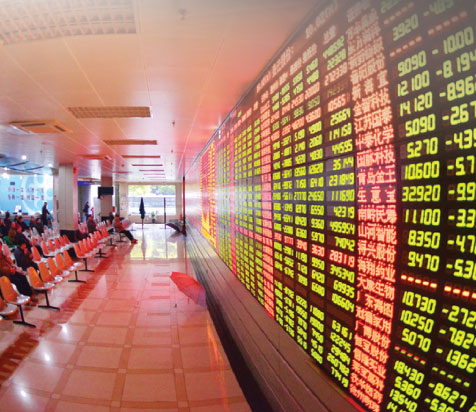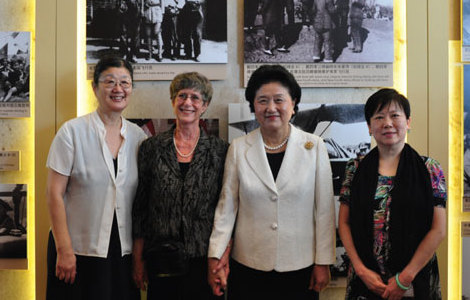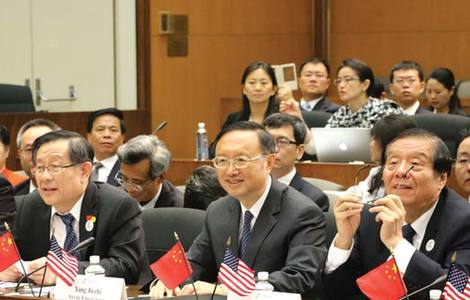Wait at the door
Updated: 2015-06-26 14:15
By Oswald Chan(China Daily USA)
|
|||||||||
Even though A shares have yet to gain entry into global indexes, investment banks are confident that continued financial liberalization on the Chinese mainland will soon make their inclusion a reality. Oswald Chan reports.
Global equity index provider MSCI (Morgan Stanley Capital International) at its June meeting deferred the inclusion of A shares in its Emerging Markets (EM) Index, the second time it did so within a year.
The decision was attributed to concerns over the quota allocation process, capital mobility restrictions and beneficial ownership of investments.
"Because MSCI's client base is so large and diverse, we have a strong interest in ensuring that remaining issues are addressed in an orderly and transparent way," said Remy Briand, managing director and global research head at MSCI. "Substantial progress has been made toward the opening of the Chinese equity market to institutional investors," he noted.
"A shares will remain on the 2016 review list for potential inclusion in the MSCI EM Index," a statement from MSCI noted. "The imminent launch of the Shenzhen-Hong Kong Stock Connect program and potential further liberalization of the QFII (Qualified Foreign Institutional Investor) program should further improve the accessibility of the A-share market."

The global equity index provider added that it may announce a decision on A-share inclusion as soon as the issues outlined are resolved. This may happen outside the regular schedule of its annual Market Classification Review.
Solution within reach
MSCI and the China Securities Regulatory Commission will form a working group to contribute to the successful resolution of these issues.
"We look forward to a fruitful collaboration that will contribute to the further opening of the A-share market to international investors and its inclusion in the MSCI EM Index," Briand added.
"We believe that the Chinese authorities understand these issues and intend to resolve them quickly. We will continue to work closely with the Chinese government as it takes further steps to implement policies," fund manager BlackRock said in a statement.
A shares refer to stocks of Chinese companies traded on the Shanghai or Shenzhen stock exchanges, quoted in renminbi and generally only available for purchase by mainland citizens. Foreign investment is only allowed through the twin, tightly regulated QFII or Renminbi Qualified Foreign Institutional Investor (RQFII) programs.
"We have noted that securities on the Shenzhen Stock Exchange are not covered in this program (that is, not eligible for reciprocal trading between Hong Kong and mainland), and this is potentially an issue for us in considering the inclusion of A shares into our standard global universe," Shirley Low Wan Boen, head of Asia Pacific at global index provider STOXX, told China Daily.
STOXX, owned by the German Deutsche Borse Group and Swiss SIX Group, currently does not include A shares in its global and regional standard indexes. However, it does have three indexes devoted exclusively to mainland stocks, namely, STOXX China A 50, STOXX China A 50 Equal Weight and STOXX China A 900.
"One of the key obstacles going against the inclusion (in global indexes) is that international investors cannot access Shenzhen-listed shares, which represent 41 percent of the total A-share market capitalization," Goldman Sachs said in its research report.
"If the Shenzhen-Hong Kong Stock Connect could be unveiled in the near future and be up and running in the fourth quarter this year, a key prerequisite for A-share inclusion in global indexes would be fulfilled, and could open a special review by the MSCI in our view. A-share inclusion by the MSCI in the fourth quarter this year is still on the cards," the Goldman Sachs report added.
While the New York-based MSCI once again deferred the inclusion of A shares in its EM Index, London-based index provider FTSE (Financial Times Stock Exchange) Group in late May said it will include A shares in its two transitional emerging markets indexes before deciding at its September meeting whether to add A shares in indexes tracked by global fund managers.
FTSE's new gauges, the FTSE Emerging Markets China A Inclusion Indexes, will have one ranking for all-capitalization stocks and another for large- and mid-cap shares.
A-share weighting in these two transitional indexes will increase when institutional investors receive or increase their RQFII or QFII allocations.
The initial weighting of A shares in the FTSE Emerging Markets China A Inclusion Indexes will be 5 percent and is expected to increase to 32 percent (as at March 31 market values) when the shares become fully available to international investors. That will result in Chinese stocks (including B shares, H shares, P Chips and Red Chips) making up 50 percent of the FTSE Emerging Markets Index, according to a statement from FTSE.
"The two new A-share inclusion indexes will merge seamlessly with the standard FTSE Emerging Market indexes when A shares fully meet FTSE's country classification criteria for emerging markets," the statement added. "Within two to three years, A shares will become eligible for inclusion in FTSE's global indexes."
"The transition to include A shares in global portfolios is now beginning and we will support this transition while ensuring that all users of our global benchmarks have sufficient time to manage the change," FTSE Russell Chief Executive Mark Makepeace said.
Despite China making substantial progress in capital market reforms (expansion of the RQFII program, launch of the Shanghai-Hong Kong Stock Connect, and the clarification of capital gains tax, for instance), the A-share market still has several limitations that tend to make global fund managers balk. MSCI first declined to include A-shares in MSCI EM Index in June last year.
According to MSCI, global investors are concerned whether they can reliably access the A-share quota through a more streamlined, transparent and predictable allocation process, should they need sufficient flexibility and assurance to secure additional quota.
Another issue is investment liquidity, with some investors continuing to express concerns about restrictions on capital lock-up and limits on the repatriation amount when they take profit in the A-share market.
A few last hurdles

Beneficiary ownership is the third key obstacle. MSCI noted that as many asset owners tend to invest through separate accounts by delegating investment and operational decisions to fund managers, recognizing clear title to ownership for the ultimate beneficial owners is a crucial concern for global investors.
The FTSE also shared the concerns of MSCI, citing the issues of capital mobility, clearing and settlement, as well as taxation, when it refused eligibility for A shares to be included in its indexes in September last year.
And STOXX'S Lou noted: "Foreign investors should be able to freely buy and sell the local currency and there should be no capital restriction as international investors have to be able to move funds freely in and out of the country, which is essential for us to consider for our STOXX standard universe."
"As the renminbi is not fully convertible, the central government is worried that complete freedom of capital flow may make the domestic share market more volatile, so it has installed the QFII or RQFII quota system for global investors to participate the A-share market," Patrick Shum Hing-hung, investment manager at Tenguard Fund Management, told China Daily.
"As the quota is limited, foreign investors are worried that inclusion in global indexes at this juncture may pressurize fund managers to scramble for the expensive A-shares."
In March of last year, MSCI initiated a consultation on a proposed roadmap for A-share inclusion. MSCI proposed that 5 percent of the float market capitalization of A shares be included as the first step, translating into a 1.3 percent weighting of the MSCI EM Index. As there are $1.7 trillion in funds tracking the MSCI EM Index, A-share inclusion is tipped to trigger capital inflows of $22.1 billion into the A-share market.
Contact the writer at oswald@chinadailyhk.com
Most Viewed
Editor's Picks

|

|

|

|

|

|
Today's Top News
China opposes US defense bill
No rest until sweeping victory against drugs, President Xi says
More people around world like China, survey finds
Victims of Charleston massacre mourned
US police fatally shoot unarmed black man in domestic dispute
Pundits cheer China-US talks
US Supreme Court upholds key Obamacare insurance subsidies
Productive talks praised
US Weekly

|

|















